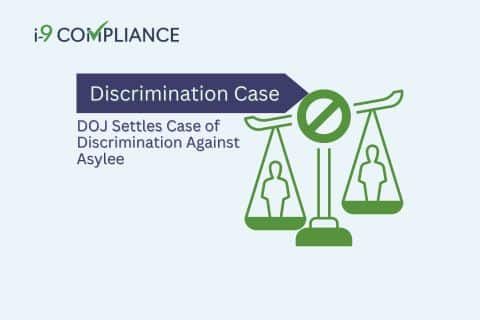DOJ Settles Case of Discrimination Against Asylee

The Department of Justice (DOJ) has reached a settlement agreement with a Maryland-based assisted living facility operator. This agreement will settle allegations that the living facility operator violated the Immigration and Nationality Act (INA). According to the DOJ, the violations happened during the employment eligibility verification (Form I-9) process.
According to Kristen Clarke, the Assistant Attorney General of the DOJ’s Civil Rights Division, “The Justice Department will continue to hold employers accountable for unlawfully discriminating against workers because of citizenship, immigration status, or national origin. Employers that discriminate against workers by rejecting their valid documents or requiring that they show unnecessary documents to prove they can continue to work violate federal law.”
The Civil Rights Division’s Immigrant and Employee Rights Section (IER) investigated the employer in response to an employee complaint. According to the employee, the assisted living facility operator discriminated against the employee during the I-9 process.
The employee claimed the operator discriminated against her due to her status as an asylee. Allegedly, the company placed her on unpaid indefinite leave after rejecting the valid documentation that proved her authorization to work in the United States. The DOJ’s Civil Rights Division discovered that the senior living home did infringe on the employee’s rights as an asylee.
This decision occurred after the investigation proved that the company refused the employee’s valid documentation and requested further documentation, which violated the INA. The DOJ stressed that employees may choose from a list of acceptable documents to prove their identity and right to work, regardless of citizenship status. As such, federal law bans employers from requesting additional documentation.
The agreement between the DOJ and the employer to settle these allegations will include the following:
- The operators of the senior living home paying a civil penalty of $6,362,
- Providing further training to Human Resources staff, and
- Undergoing department monitoring.
The employee returned to work before the company reached the settlement agreement with the DOJ. According to the case, the employee also received back wages. The DOJ emphasized that the employer must ensure it does not discriminate against anyone when hiring, firing, recruiting, or verifying an employee’s employment eligibility.
One way to avoid mistakes in the eligibility verification process is to use an electronic I-9 management system. This tool offers guidance through the I-9 verification process, an optional E-Verify integration, digital storage for I-9 documents, and notification of when to take further action.
When it comes to your employees, automation makes eligibility verification quick and simple. Ensure compliance today with I-9 Compliance.